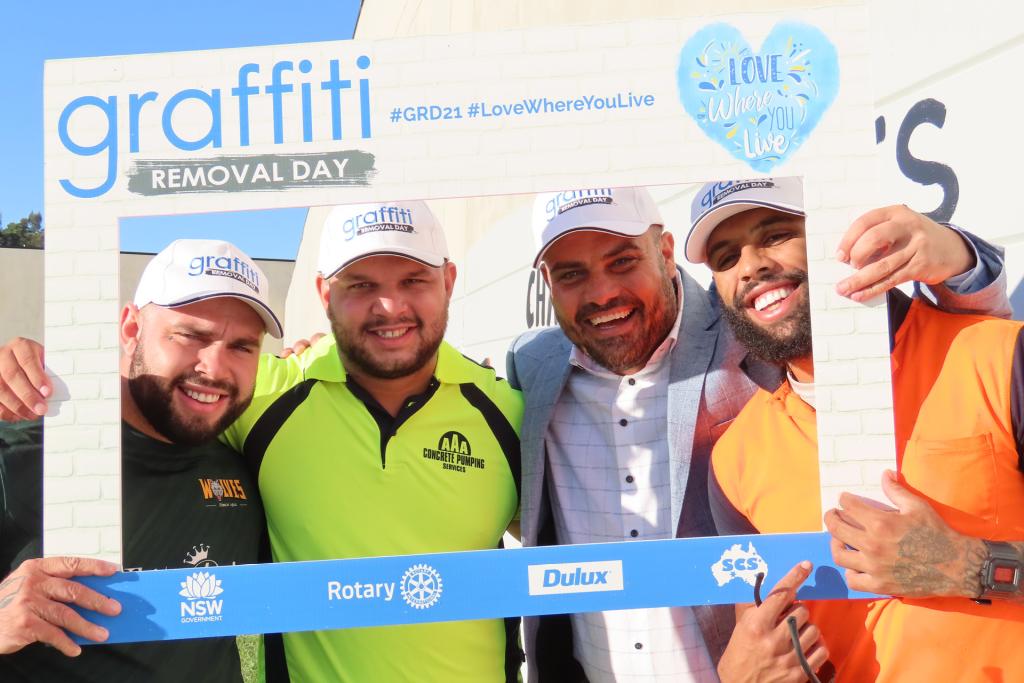Graffiti Removal Australia calls time
After 10 years of dedicated community service, Graffiti Removal Australia has ceased operation.
Following several unsuccessful attempts to obtain a decision from the NSW Government on future funding of Graffiti Removal Day, the Board of Directors of Graffiti Removal Australia agreed at their December meeting there was no other option but to shut up shop.
Chairman Bob Aitken AM reported the decision with regret, pointing to the organisation’s amazing record of service:
- 152,000 sqm of graffiti vandalism removed
- Savings to government and private property owners of more than $11.5 million
- 25,000 volunteers from all walks of life supported the campaign
- Thousands of public and government sites cleaned.
Since 2012, regular NSW Government grants of $250,000 have kept the organisation’s doors open – along with extraordinary support from major sponsors Dulux, and other corporates like Smart Graffiti in Melbourne, ARTC, Southern Cross Cleaning Services and Brookfield Asset Management.
“Graffiti Removal Australia provided the essential administrative resources to galvanise dozens of Rotary club and community-based graffiti removal teams into action each year – along with strong support from more than 50 local government councils throughout NSW,” Bob said.

While the chairman said he acknowledged the government’s financial position following multiple natural disasters in recent times, the incidence of graffiti vandalism continues to increase in many parts of the state.
“Our community is suffering, and support from corporate organisations is also light on the ground in these times.
“However, we acknowledge the outstanding support and hands-on involvement of past and present Attorneys General, Mark Smith and Mark Speakman, since the program commenced.
“These men – along with many other community leaders – rolled up their sleeves and joined volunteers on the annual graffiti removal days to take down hundreds of square metres of vandalism.”
The demise of Graffiti Removal Australia does not mean the end of the war against graffiti.
“Numerous Rotary, local government, and community-based teams will continue their inspiring work to counter the damage caused by graffiti vandals,” Bob said.
Graffiti Removal Australia has also introduced innovative ideas to combat graffiti, like gardens along exposed walls, and colourful murals in public places.
Bob praised the tireless administrative team – Project Manager Jeff Egan and Assistant Project Manager Barry Antees, along with GRA Directors Roger Norman (vice chairman), Don Wormald, Don Murray (retired last year) and Stephen Humphreys.
Rotary Down Under General Manager Gay Kiddle and Samantha Ausburn also provided invaluable administration support in the early years of the organisation.
“Appropriately, I leave the most important tribute to last – sponsorship from Dulux Paints,” Bob said.
“Without Dulux, Graffiti Removal Australia would not have got off the ground – let alone maintained 10 years of generous sponsorship worth more than a million dollars.”
The organisation also extends thanks to the thousands of volunteers who have supported the program since 2012.
Related news
Dubbo West Community Carols by Candlelight
Celebrate the festive season at Dubbo’s Carols by Candlelight, promising fun, music and the big man himself.
Sanitation solutions in Sumba
By PDG John KevanRotary Club of Mandurah Districts, WA In East Sumba, where the financial capacity to support water and health requirements for villages in remote areas is severely limited, Fair Future Foundation has been successfully providing materials and training to enable villagers to build their water and sanitation facilities for more than 15 years. […]
Queanbeyan delivers U-Turn the Wheel pilot program
Throughout May, the Rotary Club of Queanbeyan, NSW, held the 2024 pilot program of U-Turn the Wheel (UTTW) at three local high schools in Queanbeyan – The Anglican School at Googong, Karabar High School, and Queanbeyan High School. Overall, approximately 125 students took part in the one-day program. Feedback from students and staff was positive, […]
Join our newsletter for the latest updates
"*" indicates required fields


